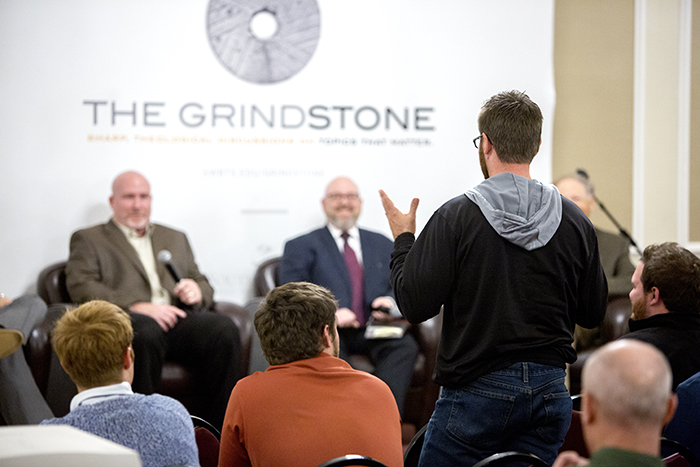Southwestern men, women receive teaching on biblical manhood, anxiety in ministry

Biblical manhood and anxiety in ministry were the topics of Southwestern Seminary’s two Grindstone discussions, Nov. 7. The former was for men only while the latter was for women only, but both discussions ultimately pointed attendees to God’s Word and how to live holy lives according to biblical teaching.
Biblical Manhood
Panelists for the biblical manhood discussion were Charles Patrick, vice president for strategic initiatives and communications at Southwestern; Ralph Smith, a member of Travis Avenue Baptist Church; and John Finch, founder of The Perfect Father Ministries Inc. Discussing the biblical teaching on manhood as well as fielding questions from the audience, the panelists emphasized the importance of men’s role as fathers.
“The first concept of God the Father a child has is his earthly father,” Patrick said. “If his earthly father is not there, how can he begin to understand who God the Father is?”
In defining biblical manhood, Patrick appealed to David’s charge to Solomon in 1 Kings 2:
“I am going the way of all the earth. Be strong, therefore, and show yourself a man. Keep the charge of the Lord your God, to walk in His ways, to keep His statutes, His commandments, His ordinances, and His testimonies, according to what is written….” (1 Kings 2:2-3a)
“To me, that is the essence of biblical manhood; doing those things—obeying God, following His commandments that He has outlined,” Patrick said. “And He outlines from Genesis to Revelation what manhood looks like—how we relate to one another as men, how we relate to our wives and to our children.”
Smith said that the first step of fatherhood is manhood. “And biblical manhood comes from thinking biblically,” he continued, “and that means memorizing Scripture.” Smith specifically noted the foundational nature of 1 Thessalonians 5:16-18 (which speak of continual joy and prayer) as well as Psalm 1 and Psalm 23. By memorizing Scripture, he asserted, men can learn and live according to God’s will.
Beyond being godly examples for one’s own children, Finch said, men should also be conscientious of how they influence children who grow up without fathers. “Most people think this issue of fatherless homes is a poverty issue, but it’s not; it’s across all socioeconomic backgrounds,” he said. “The wealthy have just as much of an issue and struggle as fathers as the poor do.”
Finch thus advised men to represent biblical manhood before all in their spheres of influence, which manifests through love, encouragement, and dedication. He also said men should tell children, such as those in their church, that they are proud of them, noting that they may be the only men from whom these children hear such a thing.
Anxiety in Ministry
For many women, anxiety can be crippling and overwhelming. Although a common and persistent affliction, panelists for the Grindstone discussion on anxiety explained that God is faithful to provide a solution to one’s anxiety. Panelists included Dorothy Patterson, first lady of Southwestern; Terri Stovall, dean of women’s programs; and Cheryl Bell, teaching fellow at Southwestern.
Bell, who frequently offers biblical counsel to women dealing with anxiety, said Scripture offers wisdom on the subject, with Psalm 139:23-24 specifically addressing this issue. Anxiety, Bell explained, is ultimately a spiritual problem and not just a reaction to stress.
“When you look at those verses closely, you begin to recognize that when God examines us, He is not looking at external behavior, but our heart,” she said. Bell continued that when women experience anxiety, it is a reflection of their hearts, not just the hurt and stress inflicted upon them.
“While external factors influence my life, it is the way I think about what has happened that causes the anxiety,” she said. “So, in essence, anxiety is a self-inflicted wound.”
Stovall encouraged women not to allow anxiety to be a defining characteristic. Rather, through God, women do not have to face anxiety alone and can find freedom from their anxiety. “If you are here and dealing with anxiety or have a loved one who is dealing with anxiety, it does not mean that they are defined by that,” Stovall said. “God can give you a way to work through that and deal with that.”
Regarding what happens when one experiences anxiety, Patterson reflected on her own experiences with anxiety and its spiritual roots in unwillingness to recognize God’s goodness and sovereignty. “What God is interested in is my coming to the end of myself and then just appealing to Him and to His mercy and to His guidance and to His showing me how I can glorify Him,” Patterson said. “But for me to really win the battle, I have to essentially do it on my knees in prayer.”



